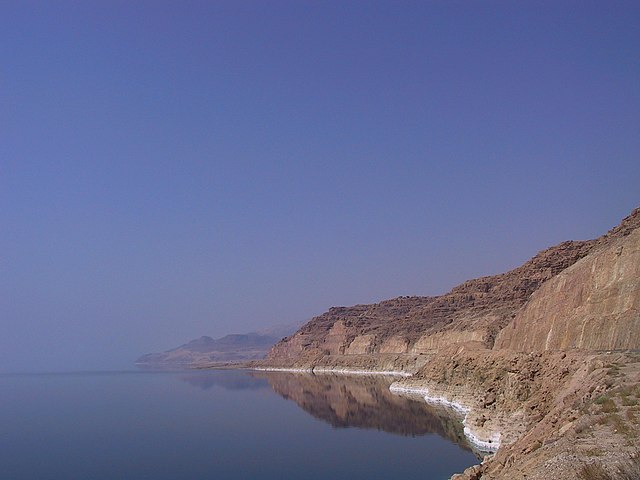
Why is the Dead Sea so salty? Because the sea evaporates very quickly and there is only one source of freshwater coming in.
The Dead Sea is not actually a sea. A sea is defined as “a body of water that is partly surrounded by land”. There are about fifty seas in the world, but the Dead Sea is completely surrounded by land, so it is a lake. In the same way that the great lakes in north America are larger than some seas, but are still only lakes. The Dead Sea is 50 km long and 15 km wide. It is 304 meters deep at its deepest point and is 430 meters below sea level. It is mostly fed by the Jordan River. It has a salinity of 34.2% which means that nothing can live in it, hence its name.
Before we look at why the Dead Sea is so salty, let’s look at what makes the regular sea salty. The sea gets its salt in two ways: runoff from the land or through the sea floor.
The sea is salty because rain washes mineral ions from the land into the sea. When it rains, the rain is very slightly acidic and over time this erodes the rocks on the land. When these rocks are eroded and broken down, the ions get washed into streams and rivers before eventually finding their way into the sea where they gradually build up over time. On average, seawater around the world is about 3.5% salt. Most of these salts are sodium and chloride which are the most dissolvable minerals.
Mineral salts are also released out of fissures in the seabed where superheated rocks cool down. Ocean water enters cracks in the sea floor and comes into contact with molten magma. This heats the water and breaks down the rock at the same time. The water loses oxygen, magnesium, and sulfates to the rock but picks up iron, zinc, and copper. The superheated water is blasted back up into the ocean and it carries the mineral salts with it.
Water first appeared on Earth about 4 billion years ago and it would have been far less salty then. Over time, the minerals have built up to its present saltiness, which was reached about 1.5 billion years ago. The sea has come to an equilibrium now and the sea gains salt at about the same rate it loses it, so it is not becoming saltier. It would be interesting if the sea kept getting saltier until it reached 100%, but that is not physically possible and would be the end of all life on Earth for multiple reasons.
This salinity is not always constant and can change around the world. Seawater that is close to the end of rivers, or glaciers, often has a lower salinity because it mixes with fresh water coming off the ice and the Dead Sea has a salinity of 34.2%.
So, why is the Dead Sea so salty? In the beginning, the Dead Sea probably formed when the area was flooded with water from the Mediterranean Sea. Since then, it has been cut off and has become a secluded lake. The lake has become saline in the same way as the sea does, but the difference here is that the water evaporates and there is not enough fresh water to replenish it.
The area around the Dead Sea is very hot and dry. The water in the lake is constantly evaporating. When water evaporates, it cannot carry the salt with it and that remains behind. Over time, this gradually increases the concentration of salt in the lake. Normally, rainfall and other water sources would keep the salinity down, but there is little rainfall and the only source of fresh water is the River Jordan. The salt sinks to the bottom of the lake and the salinity increases as you get deeper. At the deepest levels, it is saturated and the water cannot hold the salt, which builds up on the bottom of the lake.
The Dead Sea is shrinking rapidly at the moment. It will probably shrink to about one third of its current size before it stabilizes.
So, the dead sea is so salty because the water evaporates leaving concentrated salt.
Sources
https://oceanservice.noaa.gov/facts/whysalty.html
https://en.wikipedia.org/wiki/Dead_Sea
https://www.livescience.com/56047-why-is-dead-sea-so-salty.html
